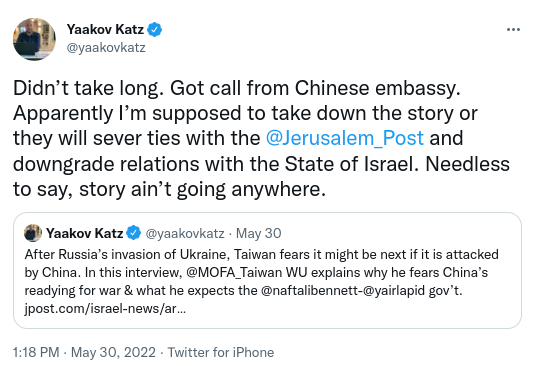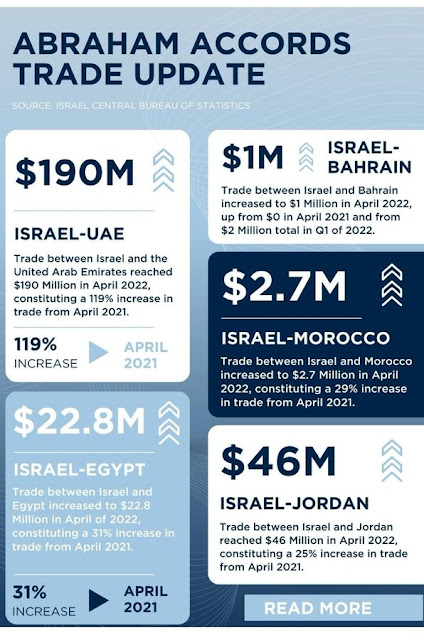By Daled Amos
China-Israel relations took decades to warm up, but when they did -- they really took off.
At least until last month.
On May 30, The Jerusalem Post featured an interview critical of China: Taiwan FM to ‘Post’: China preps to invade us, Israel can't trust Beijing:
Voicing concern about a possible Chinese invasion of his country, Taiwan’s Foreign Minister Joseph Wu warned Israel – in an exclusive interview on Monday – from relying too heavily on China.
“China is an authoritarian country and they do business in a very different philosophy,” Wu told The Jerusalem Post in a video interview from his office in Taipei. “Sometimes they use trade as a weapon, and we have seen them practicing their weaponized trade relations with many other countries.
“They did it to Lithuania, they did it to the Czech Republic and they also did it to Australia. Sometimes they try to do that to Taiwan as well. So, when we do business with an authoritarian country, we need to be very careful. We shouldn’t allow these kinds of business relations to jeopardize our national security. And I understand pretty well that Israel also places national security very high on the government agenda,” he continued. [emphasis added]
Business between Israel and China is a delicate issue.
According to the Encyclopedia Judaica, Israel was one of the first non-communist bloc countries to recognize China as the People's Republic of China in 1950. As a result, Israel severed ties with Taiwan (the Republic of China). At the time, Israeli efforts to build on ties with China fell apart. The problem was not because of any desire by China to develop ties with the Arab world. At the time, those were mainly monarchies and had an attachment to the West. Instead, the problem was the US -- China was involved in the Korean War and the US frowned on countries having any relations with Peking. [Encyclopedia Judaica, 5:472]
Which means that current US efforts to curtail Israel's dealings with China is not something new.
Relations between Israel and China finally took off in 1992. Today, China is Israel’s 3rd largest trading partner, and in 2021 China eclipsed the US to become Israel’s largest source of imports at $10.7 billion.
So what was China's reaction to Mr. Wu's interview in the Jerusalem Post?
This: an email to Yaakov Katz, the editor-in-chief of The Jerusalem Post --
So China's relations with Taiwan "is purely China's internal affair that allows no external interference" and "a basic norm?" The attempt to create "two Chinas" will never succeed?
While it may claim common business interests with Israel, especially in the areas of technology and infrastructure, China lacks an appreciation -- or simply does not care -- that Israel has a historical and cultural bond with Jerusalem that far exceeds that of the Chinese for Taiwan.
One might have thought that the Chinese attachment to Taiwan would allow them to appreciate the special Jewish attachment to Jerusalem.
Apparently not.
Instead, in keeping with their ties with the Arab world and with Iran, China supports the division of Jerusalem, and the designation of "eastern" Jerusalem as a capital for Palestinian Arabs.
I came across a post of a blogger writing about his experiences while living in China in the 1990s. He writes that he once brought up the topic of Taiwan with a Chinese official, and the response of the official was: SILENCE -- complete, total and absolute silence that would not even allow for pushing the discussion onto another topic.
He writes, "I might as well have insulted this gentleman's ancestors." And then he continues:
While a student at Beijing University, I onced asked my professor why it was that everyone from the taxi driver on the streets of Changsha to the highest government official in Zhongnanhai was uniform in their determination on the Taiwan question, it was simply put to me: "Taiwan is our Jerusalem." China, my professor explained, is simply not complete without the re-unification of Taiwan with the Mainland. He went to say that if Taiwan was to ever to formally declare its political independence Beijing would have no choice but to claim the island by force for the Chinese leadership very legitimacy would be at stake. No Chinese leader, he concluded, could stay in power overseeing the formal end to the dream of a unified country. It just won't happen he demured. [emphasis added]
But China's interests in Israel are purely a matter of business, part of its "zero enemies" policy that allows it to do business with Israel, while also doing business with Iran, supporting Palestinian Arabs and condemning Israeli actions in the UN.
According to a Pew survey, the majority of Israelis have a positive view of China. But it is not because China is cultivating any common bond with Israelis. The positive view is the result of the media campaign that China is running in Israel. It is a media campaign that China originally started running using the Jerusalem Post.
It is why China threatened that it would cut off ties with the Jerusalem Post:
But China better be careful.
The US has been very wary of Israel's deals with China, warning that some of those deals -- such as the joint venture to build the Haifa port -- might give China opportunities to spy on US naval movements.
But the US may well have a new, unexpected weapon to deal a major blow to
China's business ventures in Israel: the Abraham Accords.
An
article in The Diplomat explains
How the Abraham Accords Disrupted China-Israel Relations:
Washington had to realize that it cannot block its Middle Eastern partner from attracting foreign capital, thereby damaging its own interests in the Jewish state. Paradoxically, the Israeli domestic political crisis of 2019-2021 and the COVID-19 pandemic provided time for Washington to develop an alternative strategy to harsh pressure, while Israel was internally focused. The United States had to offer other possibilities, a strategy it is also employing in the Indo-Pacific region to sway away countries from China’s orbit.
The key to solving this conundrum came with Trump administration’s initiative in 2019-2020, the long-promised “Deal of the Century” entitled “Peace to Prosperity.” Under this framework, the Trump administration oversaw the normalization and peace agreements that came to be known as the Abraham Accords. A significant solution to the Middle Eastern economic problems would be the linking of Gulf capital, Israeli technology, global markets, and Arab labor. The first three aspects were largely achieved by the Accords, while the fourth pillar remains unsolved, as economic means cannot circumvent political solutions to the Palestinians’ plight.
Among the countries that signed the treaty, the United Arab Emirates is in the best position to provide the amount of capital needed in Israel, as long as Saudi Arabia remains only a clandestine partner of the Jewish state.
After the ceremonies ended in September 2020, economic deals between the Israelis and the Emiratis started to flow with great pace, the first “warm peace” between Israel and an Arab country. Economic cooperation was extended to all areas that were previously attracting Chinese capital, including high-tech companies, joint ventures, and critical infrastructure.
It remains to be seen if in fact the Abraham Accords really will have a dampening effect on the Israel-China business deals. The article came out a year ago.
At the very least, considering that the Biden administration shares the concern of previous administrations that China will exploit its Israeli ventures to spy on US interests, one might expect Biden to finally make an effort to persuade other Arab countries to join the Abraham Accords.
Meanwhile, there is a real bond developing between Israel and the Arab members of the Abraham Accords, the kind of bond you don't hear about developing between Israelis and the Chinese.
And on the business end of things, the Abraham Accords is working out pretty well:
Maybe China needs Israel more than Israel needs the Chinese?
|
Or order from your favorite bookseller, using ISBN 9798985708424. Read all about it here! |

|

 Elder of Ziyon
Elder of Ziyon


























